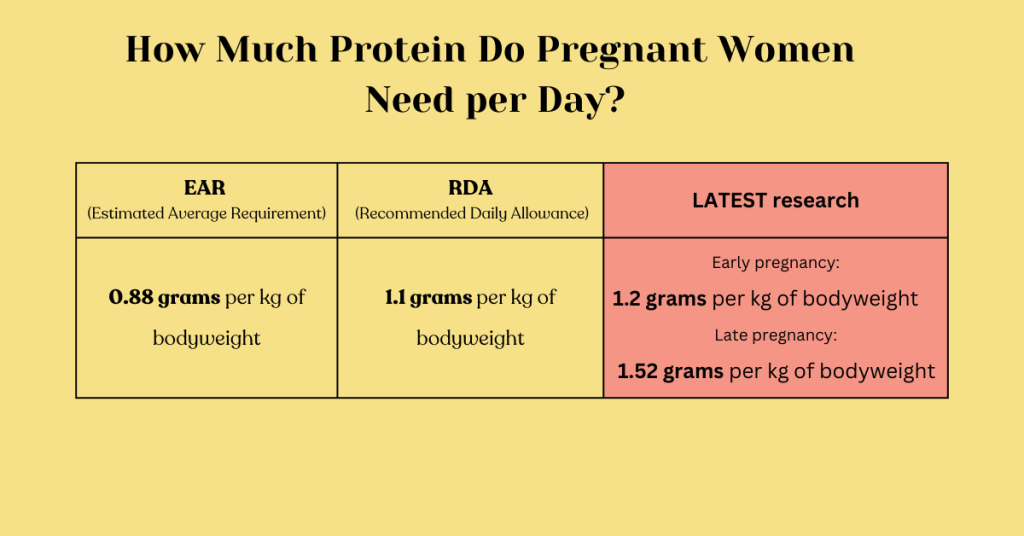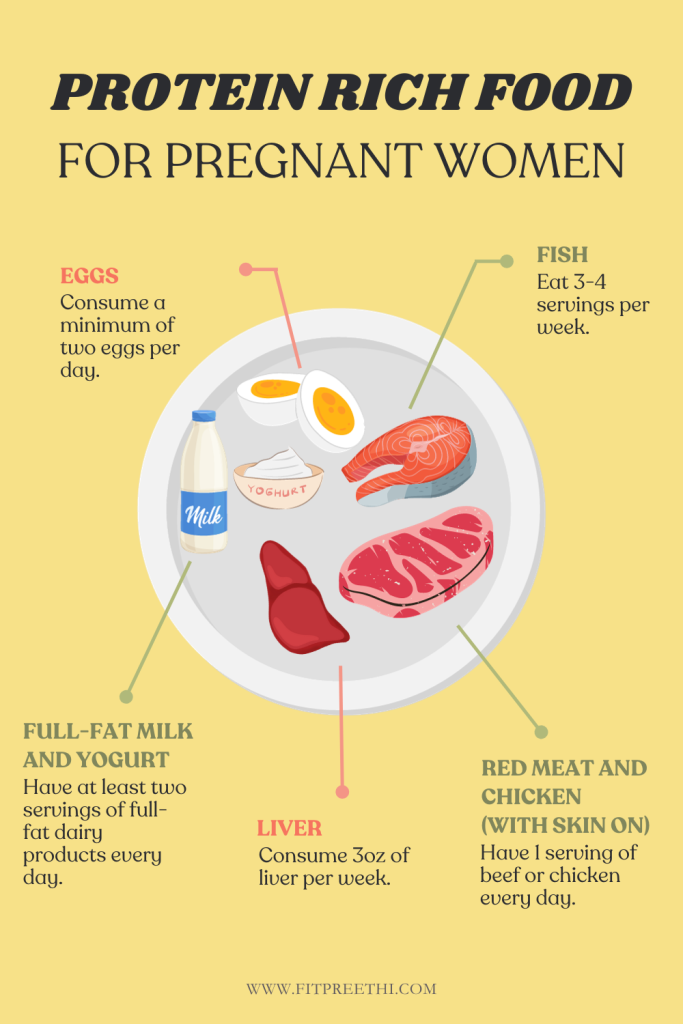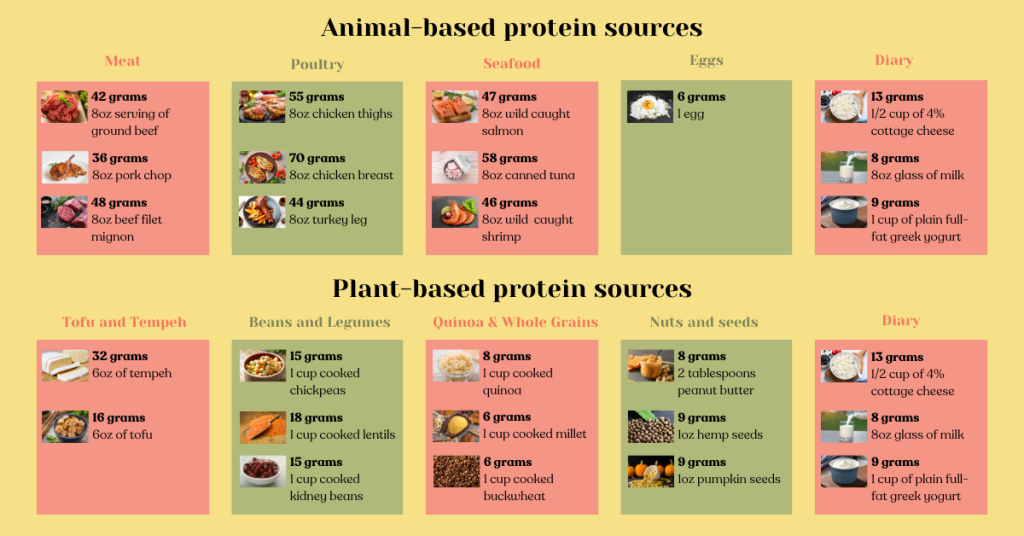Pregnant Women Are Not Eating Enough Protein
Across history, ancient cultures dedicated significant time and effort to preparing a woman’s body for pregnancy. These societies widely understood that the mother’s diet has a significant effect on the health of her child.
For instance, in India, early Sanskrit compilations of medicine such as the Ayurveda of Caraka and SuSruta contain a wealth of information on nutrition for pregnant women. Similarly, in traditional Chinese medicine, pregnant women were encouraged to consume foods that are rich in protein, calcium, and phosphorus during the second trimester and high-quality protein during the third trimester.
However, in today’s fast-paced culture, this ancient wisdom has been forgotten. As a result, many pregnant women are not receiving sufficient nutrients, particularly protein. Protein is a vital nutrient that is crucial for fetal growth and development. According to a study, one in eight pregnant women do not meet the minimum protein requirements. In fact, new research shows that the current protein recommendations for pregnant women is too low! This means that the probability of women not getting enough protein is much higher than one in eight.
In this post, we’ll talk about the dangers of insufficient protein intake, the amount of protein that a healthy pregnant woman requires (according to the latest research), and how to meet your daily protein needs during pregnancy. Let’s go!
The Risks Of Not Consuming Enough Protein During Pregnancy
We know that protein consumption is essential if we want to preserve muscle mass as we get older. But very few people talk about the importance of protein during pregnancy. Lack of protein in pregnancy can lead to various health issues for both the mother and the baby.
1) Slow fetal growth and development
Studies show that low protein intake during pregnancy can cause a decrease in amniotic fluid levels, which can cause embryonic losses, slower fetal growth and development, and reduced postnatal growth due to a deficiency in specific amino acids that are important for cell metabolism and function.
2) Preterm labor
Low protein intake means that specific amino acids are deficient in both mother and fetus. This increase the risk of preterm labor and delivery, as well as preeclampsia. Preeclampsia is a serious pregnancy complication where pregnant women have high blood pressure and organ damage. It occurs when there is a deficiency in L-arginine (an amino acid found in protein), which reduces the bioavailability of nitrogen oxide.
3) Chronic diseases later in life
Not getting enough protein during pregnancy can also have long-term effects on the baby’s health. Studies have shown that low birth weight due to inadequate protein intake can cause permanent damage and increase the risk of chronic diseases later in life, such as diabetes, hypertension, and cardiovascular disease.
4) Muscle atrophy and weakness
In addition, pregnant women who don’t get enough protein might experience muscle atrophy and weakness. This happens because their body breaks down their own muscle tissue to get the amino acids it needs. As a result, they may feel tired, have trouble with daily activities, and be at a higher risk of falls or other injuries. What’s more, it can cause stunted growth in male offspring.

In summary, the research is clear. Pregnant mothers NEED sufficient protein to prevent the dangers of slow fetal growth and development, premature labor, long-term chronic illnesses for the offspring, and muscle atrophy in the mother.
Can You Get Too Much Protein? What Are The Risks?
While not consuming enough protein during pregnancy can lead to numerous health risks, getting too much protein can also be harmful.
The risks of getting too much are similar to getting too little: slow fetal growth, increased blood pressure in male offspring, and increased risk of obesity in women.
However, it would take a significant amount of overeating protein to encounter these risks. Specifically, we’re referring to a scenario where 40% of your daily calorie intake comes from protein. For instance, a pregnant woman consuming a 2400-calorie diet would need to consume 240 grams of protein per day. It is highly unlikely for a pregnant woman to consume such a large amount of protein. There is no need to be worried about the negative effects of “consuming too much protein.”
Why The Old Dietary Guidelines Got It All Wrong
Now that we understand the risks of not consuming enough, let’s figure out how much protein pregnant women need.
Protein recommendations for humans come in two forms: Estimated Average Requirement (EAR) and Recommended Dietary Allowance (RDA). The EAR is the average daily amount of protein necessary to meet the needs of half of healthy individuals in a particular life stage and sex group. The RDA is an estimate of the minimum daily average protein intake that meets the nutrient needs of almost all (97-98%) healthy individuals in a particular life stage.
The current EAR for protein intake during pregnancy is 0.88 grams per kg of bodyweight, while the RDA requirement is 1.1 grams per kg of bodyweight. These requirements are calculated by estimating how much additional protein is needed if a pregnant person gains approximately 13 kgs during her pregnancy, using the requirements of a non-pregnant person as a baseline.
However, the problem with these estimations is that they did not consider the particular amino acid needs during pregnancy. Instead, they presumed that the amino acid requirements increase proportionally to the increased protein needs throughout pregnancy.
Then in 2014, an excellent study was conducted, which is the first-ever study carried out on real pregnant women.
What did it find? Pregnant women need more of specific amino acids and it is not 1:1 with the additional protein requirements. In short, the current protein recommendations in pregnancy were way TOO LOW.
This innovative study took a new approach to determine amino acid requirements during pregnancy and found that the daily protein requirement is 1.2 grams per kg of bodyweight in early pregnancy (~16 weeks) and 1.52 grams per kg of bodyweight in late pregnancy (~36 weeks). This means that the EAR and RDA underestimated protein requirements by up to 72%, which is a significant margin of error.

Based on this new study, a woman who is pregnant and weighs 150lbs should consume at least 82 grams of protein daily during early pregnancy and at least 103 grams of protein daily during late pregnancy. This is the BARE MINIMUM.
For me, I prefer to eat at least 100 grams of protein to be safe. If I consume less than that, I can feel the effects of low protein such as fatigue, poor recovery, brittle hair, and so on.
What Are The Best Sources Of Protein For Pregnant Women?
To ensure a healthy pregnancy, women should consume high-quality animal protein that provide all nine essential amino acids.

Let’s look at some foods that are a good source of protein that pregnant woman should eat:
Eggs
Consume a minimum of two eggs per day. Eggs are a superfood and are packed with choline, which is important for your baby’s brain development. Two eggs make up half of a pregnant woman’s daily choline requirements, as well as more than half of your daily requirements for key nutrients such as vitamin D, folate, and selenium, which are also important for your baby’s growth and development. Folic acid is an important micronutrient during pregnancy and rather than taking synthetic folic acid, it is much better to get folate from real foods like eggs.
Red Meat and Chicken (with Skin On)
Have 1 serving of beef or chicken every day. Meat on the bone is especially nutritous because it contains glycine and collagen. Red meat, in particular, is packed with iron, zinc, vitamin B, and many other important vitamins. Many women have iron deficiency when pregnant and end up taking iron supplements which can irritate the gut. I find that eating beef at least a few times a week is the best way to keep my iron levels in check.
Liver
Consume 3oz of liver per week. Liver is a powerhouse when it comes to folate and B12. Folate helps prevent birth defects. B12 decreases the chances of neural tube defects, miscarriage, preterm labor, low birth weight, and stillbirth. A bit of liver goes a long way!
Fish
Eat 3-4 servings of fish per week. Fatty fish is loaded with has omega-3 fatty acids which improves baby’s eye and brain health. You can get an extra big iodine boost from choosing fish like cod, shrimp, and scallops. Iodine helps increase birth weight, reduces perinatal and infant mortality and makes children smarter. You might be thinking, “What about mercury?”. That’s a valid concern but there are a lot of options which are low in mercury, such as wild-caught salmon, canned oysters, fish eggs, cod, and shrimp.
Full-Fat Milk and Yogurt
Have at least two servings of full-fat dairy products every day. What makes dairy so great? It’s filled with protein, fat-soluble vitamins, carbohydrates, and probiotics. Moreover, milk has calcium and also vitamin K2, which works with vitamin A and vitamin D to support bone health in you and your little one.

For those on a vegetarian or vegan diet who do not eat animal products, you can eat plant-based proteins like lentils, beans, tofu or tempeh. It can be easy to overdo carbs on a vegetarian or vegan diet, so be mindful of picking protein-rich foods for all your meals.
However, it is important to note that plant-based proteins may not contain all essential amino acids in adequate amounts. It is important that you combine a variety of plant-based protein foods to get all your essential amino acids. If you are having a hard time getting enough protein from food alone, plant-based protein powders can be a good idea.

I wrote two detailed blog posts on how to consume at least 100 grams of protein a day. The first one assumes you eat an animal-based diet, and the second assumes you are vegetarian:
- How to eat 100 grams of protein per day (+ example day of eating)
- Indians don’t eat enough protein (Let’s Fix That!)
Conclusion
If you or someone you know is pregnant, it’s important to understand the need for proper protein intake. It’s concerning that many pregnant women aren’t getting enough protein, which can impact the health of future generations. Please share this information with your friends and family to help spread the word.
If you have any questions, feel free to ask me in the comments!






